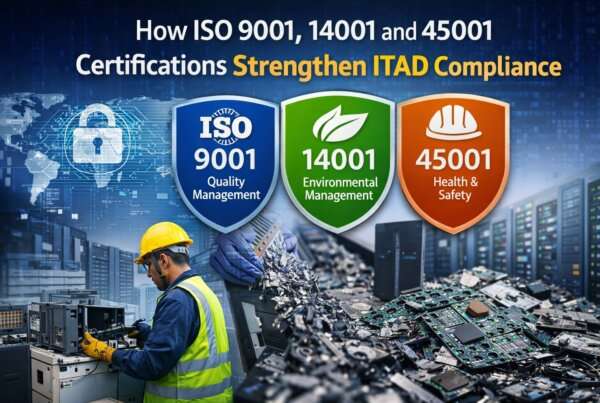Are You Overspending on Internal IT Disposal? Compare DIY vs Managed IT Disposal Services
Every organization eventually reaches a point where outdated, damaged, or end-of-life IT equipment needs to be removed. From hard drives and servers to networking gear, medical devices, and enterprise storage systems, the volume of equipment cycling out each year continues to grow. Yet many companies still rely on internal staff to manage disposal—assuming it’s simpler, cheaper, and more convenient.
But the truth is that DIY IT disposal often costs far more than leaders realize. Not just in labor, but in risk, compliance exposure, inefficient processes, lost asset value, and overlooked expenses that add up quietly in the background.
This guide breaks down the real cost of internal IT disposal, compares it directly with outsourced IT Disposal Services, and helps you determine the most cost-effective, compliant path forward. If your goal is to reduce risk, save time, and unlock value from your retired assets, this side-by-side comparison will help you make a confident, informed decision.
Why IT Disposal Matters More Than Ever
In today’s environment—where data compliance requirements are tightening and hardware refresh cycles are accelerating—the stakes for secure IT disposal continue to rise. Organizations must not only protect sensitive data but also handle equipment responsibly, sustainably, and in accordance with federal, state, and industry regulations.
Professional IT Disposal Services provide:
-
Verified data sanitization
-
Environmental responsibility
-
Proper documentation
-
Chain-of-custody tracking
-
Liability protection
-
Safe remarketing and value recovery
DIY disposal rarely includes all of these protections, making it more risky and more expensive than it initially appears.
The Hidden Costs of DIY IT Disposal
Most companies don’t consider IT disposal a budget line item—but the work still consumes resources. When internal teams handle IT disposal, the hours, risks, and lost revenue opportunities can quietly chip away at operational budgets.
Below are the most common—and often most overlooked—costs of doing it yourself.
1. Labor Costs Add Up Quickly
IT staff are expensive. When they’re sorting, wiping, packaging, inventorying, or transporting old equipment, they are not focusing on core responsibilities such as network security, uptime, end-user support, or infrastructure performance.
Common DIY labor tasks include:
-
Removing old hardware
-
Serializing and documenting assets
-
Preparing shipping and packing materials
-
Wiping drives with consumer-grade software
-
Coordinating freight or disposal
-
Storing equipment in secure locations
Even small batches of equipment can consume multiple IT staff for days or weeks.
The Reality
Most businesses underestimate labor costs by 40–60% when they handle disposal in-house.
2. Compliance Risks Are Higher Internally
IT disposal isn’t just a logistical process—it’s a compliance requirement. Internal teams rarely have the tools, certifications, or audit-ready documentation that enterprise security frameworks require.
DIY disposal often lacks:
-
NIST 800-88 compliant data wipes
-
Verified tracking and chain-of-custody
-
Certificates of Data Destruction
-
Serialized reporting
-
Environmental and recycling documentation
-
Liability coverage
A single misstep can expose an entire organization to:
-
Data exposure
-
Regulatory fines
-
Breach investigations
-
Legal liability
-
Loss of customer trust
Professional IT Disposal Services eliminate these risks entirely.
3. Improper Recycling Can Lead to Fines
E-waste regulations vary by state and industry. Many organizations unintentionally violate rules by discarding equipment improperly or using unvetted recyclers.
Pitfalls include:
-
Disposing of batteries incorrectly
-
Sending hazardous materials to landfills
-
Allowing untrained staff to dismantle equipment
-
Partnering with uncertified recyclers
DES Technologies ensures downstream vendors meet strict R2v3 and ISO standards, protecting your organization from environmental violations.
4. Lost Asset Value = Lost Revenue
Internal teams often throw away or scrap IT equipment that still holds resale value. Even equipment that’s several years old can generate thousands of dollars when properly sanitized, tested, and remarketed.
Examples of overlooked value:
-
Servers and switches
-
Enterprise storage arrays
-
Laptops and desktops
-
Hard drives and SSDs
-
Medical devices
-
Networking equipment
Managed IT Disposal Services unlock that hidden value through professional remarketing channels.
5. Storage Costs and Operational Delays
Retired equipment often piles up in:
-
Closets
-
Unused offices
-
Server rooms
-
Warehouses
This creates safety hazards, consumes critical space, and prevents new assets from being deployed.
Professional services remove equipment quickly and efficiently, allowing your operations to continue without bottlenecks.

DIY IT Disposal vs Managed IT Disposal Services: A Direct Comparison
| Category | DIY IT Disposal | Managed IT Disposal Services |
|---|---|---|
| Labor Cost | High (internal hours) | Low (fully outsourced) |
| Data Security | Inconsistent | Fully documented & compliant |
| Compliance | High risk | Audit-ready |
| Asset Value Recovery | Limited | Maximum return |
| Environmental Responsibility | Often unclear | Certified & transparent |
| Logistics & Packing | On your team | On the provider |
| Chain-of-Custody | Rare | Guaranteed |
| Speed & Efficiency | Slow | Fast & streamlined |
| Liability Protection | Minimal | Comprehensive |
The takeaway is simple:
DIY disposal looks cheaper upfront, but costs more in the long run.
Why Managed IT Disposal Services Save You Money
Choosing a professional partner like DES Technologies provides measurable savings through:
-
Reduced labor hours
-
Lower compliance exposure
-
Faster decommissioning
-
Maximal asset value recovery
-
Eco-friendly processing
-
End-to-end documentation
-
Secure chain-of-custody
It’s not just a convenience—it’s a smarter financial strategy.
How DES Technologies Delivers Secure, Cost
Effective IT Disposal Services
As a trusted ITAD provider with decades of experience, DES Technologies provides a complete, fully managed solution designed to reduce risk, recover value, and remove the burden from your internal team.
Our IT Disposal Services Include:
✔ NIST 800-88 Data Wiping
Certified data sanitization ensures complete, verifiable destruction.
✔ On-Site & Off-Site Data Destruction
We provide secure data destruction wherever your equipment resides.
✔ Secure Chain-of-Custody
From pickup to final processing, all movements are tracked and verified.
✔ Asset Recovery & Buyback
We help clients reclaim value from surplus and end-of-life equipment.
✔ Eco-Friendly Processing
We follow strict R2v3 and ISO environmental standards.
✔ Enterprise Logistics & Packing
Our specialists handle removal, packing, and transportation.
✔ Full Reporting & Certificates
You receive documentation for compliance, audits, and legal requirements.
✔ Fast Nationwide Pickup
No need for storage or extended downtime.
When Does DIY Make Sense?
There are circumstances where internal disposal may be sufficient:
-
Very small quantities of low-value equipment
-
Non-sensitive devices with no data
-
Organizations with in-house certified destruction tools
But for any environment with sensitive data, compliance requirements, or high-value assets, professional services are always the more secure and cost-efficient path.
Final Verdict: Are You Overspending by Keeping IT Disposal In-House?
In most cases—yes.
When you compare labor, risk, lost value, environmental obligations, and operational delays, the cost of DIY disposal far outweighs the investment of outsourcing.
Professional IT Disposal Services from DES Technologies eliminate hidden expenses, protect your organization, and unlock value from equipment you’re no longer using.
If your internal teams are stretched thin or if you want better security, documentation, and ROI, partnering with a certified ITAD provider is the clear path forward.





